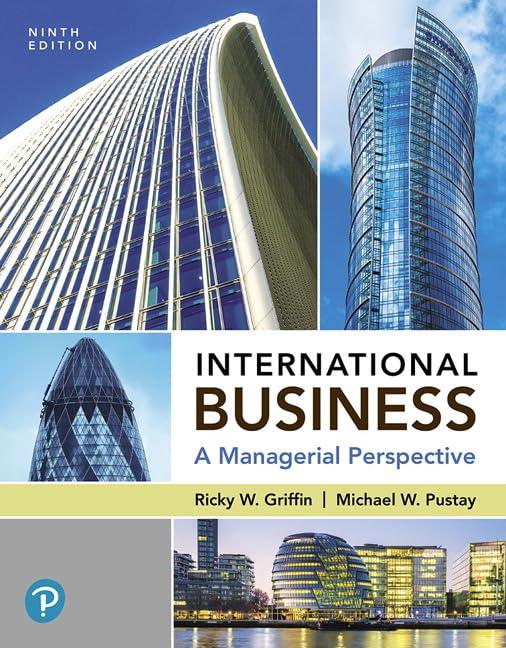What is more important to an economyexports or foreign capital inflows? During the past decade the U.S.
Question:
What is more important to an economy—exports or foreign capital inflows?
During the past decade the U.S. BOP performance could be characterized as follows:
The U.S. current account recorded large annual deficits.
The U.S. capital account recorded large annual surpluses of roughly the same magnitude as the current account deficits.
Changes in the official reserves account were small relative to the magnitude of the current account deficits.
Two scenarios can be developed from the facts just cited:
The sky is falling. U.S. industries are uncompetitive in international markets (as indicated by the first fact), and foreigners are taking over the country by buying up valuable U.S. assets and transforming the country into the largest debtor in international history (as indicated by the second fact).
Everything is wonderful. Foreigners are so enthralled with the future prospects of the U.S. market, which is a showcase of economic democracy, that they are eagerly investing in the U.S. economy (the second fact). The only way they can do so, however, is by running a current account surplus with the United States (the first fact).
Needless to say, these two scenarios conflict, even though both are consistent with the data. They reflect a policy war that is occurring between protectionists and free traders, between unions and MNCs, between liberals and conservatives, and between firms threatened by foreign imports and export-oriented firms.
People who believe the sky is falling argue that the United States must reduce its balance of trade deficit. They argue that U.S. firms are increasingly uncompetitive in global markets and must be strengthened via aggressive government policies, such as those calling for worker training programs, increased investment in infrastructure, and tax credits for R&D and investment expenditures. These people assert that U.S.
firms are victimized by the unfair trade practices of foreign firms and governments. They propose stiffer tariffs and quotas on imported goods and believe that the federal government should do more to promote U.S.
exports and restrict foreign ownership of U.S. assets.
People who believe everything is wonderful say the best policy is to continue to make the United States an attractive economy in which to invest. By keeping tax rates low and governmental regulation modest, the United States will attract foreign capital. U.S. industries, consumers, and workers will then benefit from increased capital investment and the enhancements in productivity that will ensue from this investment. U.S.
consumers will benefit from the availability of low-priced, high-quality imported goods and services. Moreover, U.S. firms will become “leaner and meaner” as they respond to foreign competitors.
A variant of this “everything is wonderful” argument has been offered by the late Nobel laureate Milton Friedman, the provocative free-market advocate from the University of Chicago. Friedman argued that foreign companies have been busily producing Blu-ray players, luxury automobiles, and smartphones in return for dollar bills from U.S.
consumers. If these companies are happy voluntarily exchanging their goods for pieces of paper (that is, dollar bills), and U.S. citizens are happy voluntarily exchanging pieces of paper for goods, why should anyone worry?
As you ponder these divergent perspectives, recognize that they have developed because of two different views of what represents a BOP deficit. The “sky is falling” crowd is focusing on the balance on merchandise trade and assessing whether U.S. firms are able to sell as many goods to foreigners as foreigners sell to Americans. The “everything is wonderful” folks are focusing on voluntary transactions in the marketplace. In their view, if U.S. citizens find that being net buyers of foreign goods is in their self-interest and foreigners find that being net buyers of U.S. assets is in their self-interest, then what is the problem?
Because BOP statistics affect the ongoing domestic political battle over international trade policy, they are important to virtually every U.S. firm.
Export-oriented firms and workers benefit from the free trade policies promoted by the “everything is wonderful” crowd, as do communities that benefit from jobs created by inward FDI. Firms and workers threatened by imported goods or by the output of new domestic factories built by foreign competitors are more likely to support the “sky is falling”
view.
Step by Step Answer:






